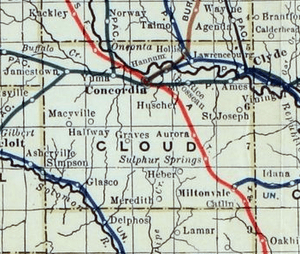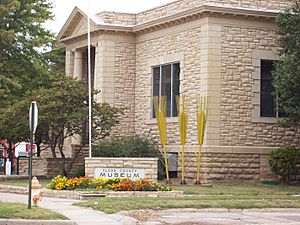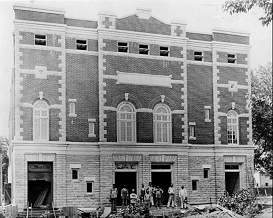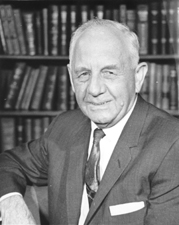Concordia, Kansas facts for kids
Quick facts for kids
Concordia, Kansas
|
|
|---|---|
|
City and County seat
|
|
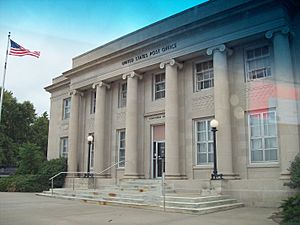
Concordia Post Office (2007)
|
|
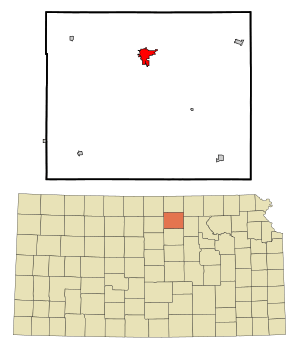
Location within Cloud County and Kansas
|
|
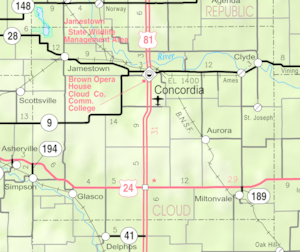
|
|
| Country | United States |
| State | Kansas |
| County | Cloud |
| Founded | 1870 |
| Platted | 1871 |
| Incorporated | 1872 |
| Named for | Concordia, Missouri |
| Government | |
| • Type | Commission-Manager |
| Area | |
| • Total | 4.50 sq mi (11.66 km2) |
| • Land | 4.50 sq mi (11.66 km2) |
| • Water | 0.00 sq mi (0.00 km2) |
| Elevation | 1,385 ft (422 m) |
| Population
(2020)
|
|
| • Total | 5,111 |
| • Density | 1,135.8/sq mi (438.34/km2) |
| Time zone | UTC-6 (CST) |
| • Summer (DST) | UTC-5 (CDT) |
| ZIP code |
66901
|
| Area code | 785 |
| FIPS code | 20-15200 |
| GNIS ID | 485559 |
Concordia is a city in Kansas, USA. It's the main city, or county seat, of Cloud County. The city is located along the Republican River in a beautiful area of Kansas called the Smoky Hills. This part of the state is known as North Central Kansas.
In 2020, about 5,111 people lived in Concordia. The city is home to Cloud County Community College, a two-year college, and the Nazareth Convent and Academy.
Contents
History of Concordia
How Concordia Started
Concordia has a unique history. It was chosen as the county seat (the main city of the county) even before the town was actually built! A man named James M. Hagaman planned out the whole town on paper. He drew streets, blocks, a courthouse, and parks.
The name "Concordia" was picked because one of the early founders, "Cap" Snyder, had lived in Concordia, Missouri. He liked the name because it honored the German heritage of many settlers. "Concordia" is a German name found in old poems.
Becoming a City
In December 1869, the first election for the county seat was held. Concordia, Clyde, and a town called Sibley were the choices. Since no town won a clear majority, a second election happened on January 4, 1870. Concordia won against Sibley with 165 votes to 129.
Concordia officially became a community when the Republican Land District Office opened on January 16, 1871. This office helped people claim land. In August 1872, Concordia officially became a city under Kansas law. Its first mayor was R. E. Allen.
Early Visitors and Schools
Many famous traveling shows visited Concordia in its early days. As early as 1876, entertainers like Wild Bill Hickok and Buffalo Bill Cody came to town. The Ringling Brothers circus also visited. In 1892, a Ringling train had an accident near Concordia, but the show still went on the next day for 4,000 people!
The first schoolteacher in Concordia was Milo Stevens. He earned $20 a month. A special school for teachers, called a normal school, was set up in Concordia in 1874. However, the state stopped funding it in 1876, and the school closed.
Railroads and Floods
In 1887, the Atchison, Topeka and Santa Fe Railway built a train line through Concordia. Today, this railroad is part of the BNSF Railway, but many locals still call it the "Santa Fe."
The Republican River caused major floods in Concordia. On July 9, 1902, a flood changed the river's path by a quarter of a mile! Another big flood happened on June 20, 1915.
In 1912, Concordia had a huge blizzard. The snow was so deep that a train got stuck, and snowbanks on the main street were as tall as people's heads.
World War II Camp
From 1943 to 1945, during World War II, Camp Concordia was a special camp near the city. It held German POWs.
Geography and Climate
Where is Concordia?
Concordia is located in north-central Kansas. It sits on the south side of the Republican River in the Smoky Hills area. A smaller stream called Lost Creek flows along the western edge of the city.
The city is about 125 miles (201 km) north of Wichita and 169 miles (272 km) west-northwest of Kansas City. It's at the crossing of two main roads: U.S. Route 81 and K-9. The city covers about 4.32 square miles (11.19 km2) of land.
Concordia's Weather
Concordia has a humid continental climate. This means it has hot, humid summers and cold, dry winters.
- The average temperature in January is about 28.6°F (–1.9°C).
- The average temperature in July is about 79.1°F (26.2°C).
- On average, there are about 7 days each year that reach 100°F (38°C) or hotter.
- There are about 4 days each year when the temperature drops to 0°F (–18°C) or colder.
- The most rain usually falls in May.
- Concordia gets about 19.3 inches (49 cm) of snow each winter.
| Climate data for Concordia, Kansas (Blosser Municipal Airport), 1991–2020 normals, extremes 1885–present | |||||||||||||
|---|---|---|---|---|---|---|---|---|---|---|---|---|---|
| Month | Jan | Feb | Mar | Apr | May | Jun | Jul | Aug | Sep | Oct | Nov | Dec | Year |
| Record high °F (°C) | 78 (26) |
86 (30) |
97 (36) |
100 (38) |
102 (39) |
109 (43) |
114 (46) |
116 (47) |
112 (44) |
102 (39) |
85 (29) |
82 (28) |
116 (47) |
| Mean maximum °F (°C) | 62.1 (16.7) |
68.1 (20.1) |
78.8 (26.0) |
85.5 (29.7) |
91.8 (33.2) |
98.0 (36.7) |
101.8 (38.8) |
100.2 (37.9) |
95.7 (35.4) |
87.9 (31.1) |
74.1 (23.4) |
62.8 (17.1) |
103.3 (39.6) |
| Mean daily maximum °F (°C) | 38.7 (3.7) |
43.5 (6.4) |
55.4 (13.0) |
64.9 (18.3) |
74.8 (23.8) |
86.0 (30.0) |
90.3 (32.4) |
87.7 (30.9) |
80.4 (26.9) |
67.5 (19.7) |
53.0 (11.7) |
41.1 (5.1) |
65.3 (18.5) |
| Daily mean °F (°C) | 28.8 (−1.8) |
32.8 (0.4) |
43.5 (6.4) |
53.1 (11.7) |
63.5 (17.5) |
74.4 (23.6) |
78.9 (26.1) |
76.4 (24.7) |
68.5 (20.3) |
55.6 (13.1) |
42.1 (5.6) |
31.5 (−0.3) |
54.1 (12.3) |
| Mean daily minimum °F (°C) | 18.9 (−7.3) |
22.1 (−5.5) |
31.7 (−0.2) |
41.2 (5.1) |
52.2 (11.2) |
62.8 (17.1) |
67.4 (19.7) |
65.1 (18.4) |
56.5 (13.6) |
43.7 (6.5) |
31.3 (−0.4) |
21.9 (−5.6) |
42.9 (6.1) |
| Mean minimum °F (°C) | −1.0 (−18.3) |
2.9 (−16.2) |
11.9 (−11.2) |
25.3 (−3.7) |
37.4 (3.0) |
50.8 (10.4) |
56.4 (13.6) |
53.9 (12.2) |
40.5 (4.7) |
25.9 (−3.4) |
14.3 (−9.8) |
3.8 (−15.7) |
−4.9 (−20.5) |
| Record low °F (°C) | −33 (−36) |
−25 (−32) |
−11 (−24) |
12 (−11) |
24 (−4) |
41 (5) |
46 (8) |
41 (5) |
29 (−2) |
14 (−10) |
−15 (−26) |
−26 (−32) |
−33 (−36) |
| Average precipitation inches (mm) | 0.67 (17) |
0.86 (22) |
1.53 (39) |
2.53 (64) |
4.34 (110) |
3.83 (97) |
4.15 (105) |
3.49 (89) |
2.80 (71) |
1.98 (50) |
1.16 (29) |
1.04 (26) |
28.38 (719) |
| Average snowfall inches (cm) | 5.4 (14) |
5.2 (13) |
1.6 (4.1) |
0.4 (1.0) |
0.0 (0.0) |
0.0 (0.0) |
0.0 (0.0) |
0.0 (0.0) |
0.0 (0.0) |
0.3 (0.76) |
1.9 (4.8) |
4.5 (11) |
19.3 (48.66) |
| Average precipitation days (≥ 0.01 in) | 4.8 | 5.2 | 7.2 | 8.7 | 11.9 | 10.1 | 9.3 | 9.0 | 7.0 | 6.6 | 5.1 | 5.0 | 89.9 |
| Average snowy days (≥ 0.1 in) | 3.0 | 3.2 | 1.4 | 0.4 | 0.0 | 0.0 | 0.0 | 0.0 | 0.0 | 0.3 | 1.3 | 2.7 | 12.3 |
| Source 1: NOAA | |||||||||||||
| Source 2: National Weather Service | |||||||||||||
People of Concordia
| Historical population | |||
|---|---|---|---|
| Census | Pop. | %± | |
| 1880 | 1,853 | — | |
| 1890 | 3,184 | 71.8% | |
| 1900 | 3,401 | 6.8% | |
| 1910 | 4,415 | 29.8% | |
| 1920 | 4,705 | 6.6% | |
| 1930 | 5,792 | 23.1% | |
| 1940 | 6,255 | 8.0% | |
| 1950 | 7,175 | 14.7% | |
| 1960 | 7,022 | −2.1% | |
| 1970 | 7,221 | 2.8% | |
| 1980 | 6,847 | −5.2% | |
| 1990 | 6,167 | −9.9% | |
| 2000 | 5,714 | −7.3% | |
| 2010 | 5,395 | −5.6% | |
| 2020 | 5,111 | −5.3% | |
| U.S. Decennial Census 2010-2020 |
|||
Concordia is the most populated city in Cloud County and the surrounding areas.
2020 Population Facts
The 2020 United States census found that 5,111 people lived in Concordia. There were 2,023 households, and 1,169 families.
- Most residents (about 89.6%) were white.
- About 2.2% were black or African-American.
- About 5.8% of the population was Hispanic or Latino.
- About 26.9% of households had children under 18.
- The average household had 2.2 people.
- The average age in the city was 37.5 years old.
- About 21.6% of the population was under 18.
- About 20.5% of the population was 65 or older.
Education in Concordia
Colleges
Concordia is home to Cloud County Community College. This is a two-year college where students can earn an associate's degree. In the past, Concordia also had a Normal School (for teachers) and a Business College.
Schools for Kids
The public schools in Concordia are part of the Concordia USD 333 school district.
- Students in kindergarten through 6th grade attend different elementary school buildings.
- Students in 7th through 12th grade go to Concordia Junior-Senior High School.
- The school district also has the Cloud County Alternative High School. This school helps students earn their diploma online or through computer classes.
A Catholic high school called Notre Dame High School operated from 1962 to 1969. It then became a Catholic grade school until 1971. After that, the local school district bought the building. It is now used as Concordia Middle School for fifth and sixth graders.
Libraries
Concordia has the Frank Carlson Library, a public library named after a former Kansas governor. Another important library in Concordia's history was the Carnegie Library. It was built in 1908 with a $10,000 gift from Andrew Carnegie.
Getting Around Concordia
Concordia has its own airport called Blosser Municipal Airport (CNK). The city owns this airport. The National Weather Service and the Kansas National Guard have facilities there.
News and Radio
The Concordia Blade-Empire is the local newspaper. It publishes five days a week.
Concordia also has several radio stations:
- KNCK (1390 AM) and KNCK-FM (94.9 FM) are privately owned.
- KVCO (88.3 FM) is run by Cloud County Community College. It's a project for students studying broadcast journalism.
Things to See and Do
Cool Places to Visit
- The Brown Grand Theatre: In 1905, a local resident named Colonel Napoleon Bonaparte Brown decided to build a grand opera house for Concordia. It was designed by a famous architect, Carl Boller. Today, the 650-seat Brown Grand Theatre has been restored to look like it did in 1907. It's a popular place for tourists and hosts many shows and community events.
- Camp Concordia: This was a prisoner of war camp for German soldiers during World War II. It was located a few miles north of Concordia. The original guard house from the camp is still there and has been restored.
- Cloud County Historical Museum: This museum is in the old 1908 Andrew Carnegie Library building. It has many historical items from early Kansas. You can see things like old radios, quilts, tools, and even a 1908 Lincoln-Page Airplane and an 1898 Holsman car! The museum also has one of the largest hand-carved brick murals.
- Cloud County Veterans Memorial: This memorial is in the courthouse area of Concordia. It has an "eternal flame" that has been burning since it was set up on November 11, 1968.
- National Orphan Train Complex: This complex is in the old Union Pacific Railroad Depot. It has a museum and research center dedicated to the Orphan Train Movement. From 1854 to 1929, many children from crowded East Coast cities were sent by train to live with families in the Midwest. This museum tells their stories.
- Nazareth Convent and Academy: This beautiful building was built in 1903. It is the main home for the 260 Sisters of St. Joseph of Concordia. The Sisters were known for educating young women, teaching them academics, music, and arts.
- Historic Bridges: One famous old bridge is the Republican River Pegram Truss. It was built in 1893 for the Union Pacific Railway and is still used for cars today. Other historic bridges nearby include the County Line Bowstring bridge and the Pott's Ford Bridge. All three are listed on the National Register of Historic Places.
- Stained Glass Capital: Concordia is known as "The Stained Glass Capital of Kansas." You can take a tour to see many beautiful stained glass pieces in churches and private homes around the city.
Parks and Fun Activities
- Hunting: Many people come to Concordia for small game hunting, especially for birds like pheasant, quail, and dove. The start of hunting season is a very busy time for the city.
- Camping: The city of Concordia offers free overnight camping at Airport Park. This is one of several city parks and is located at the Blosser Municipal Airport.
Famous People from Concordia
Many notable people have connections to Concordia.
- Frank Carlson: A very important person from Concordia, he was a former Governor of Kansas, a congressman, and a Senator.
- Jim Garver: A guitarist who played for the famous country singer Garth Brooks.
- Robert E. Pearson: A movie director.
- Marilyn Schreffler: An actress known for doing voices in many animated TV shows.
- Boston Corbett: A Union soldier during the American Civil War who is famous for shooting John Wilkes Booth, the man who assassinated Abraham Lincoln.
- Greg Brummett: A baseball player who pitched for the San Francisco Giants and Minnesota Twins.
- Ernie Quigley: A professional basketball referee and baseball umpire who is in the Basketball Hall of Fame.
- Kaye Vaughan: A Canadian Football League player who is in the Canadian Football Hall of Fame.
Images for kids
See also
 In Spanish: Concordia (Kansas) para niños
In Spanish: Concordia (Kansas) para niños
 | John T. Biggers |
 | Thomas Blackshear |
 | Mark Bradford |
 | Beverly Buchanan |


